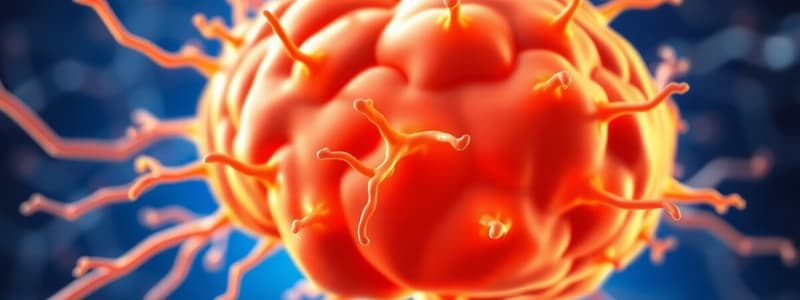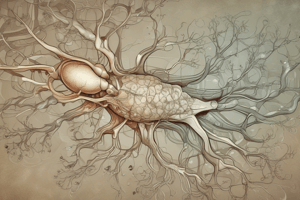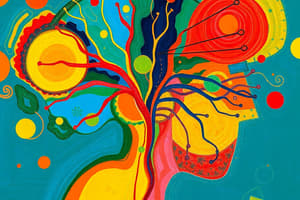Podcast
Questions and Answers
What is the primary role of the nervous system in relation to the endocrine system?
What is the primary role of the nervous system in relation to the endocrine system?
- It controls fewer body systems.
- It facilitates internal homeostasis more quickly. (correct)
- It integrates sensory information more efficiently.
- It has a slower response time.
What is the primary role of the Na+-K+ pump in neurons?
What is the primary role of the Na+-K+ pump in neurons?
- Enhance depolarization speed
- Facilitate neurotransmitter release
- Maintain action potential duration
- Establish resting membrane potential (correct)
Which type of neuron primarily carries sensory information to the central nervous system?
Which type of neuron primarily carries sensory information to the central nervous system?
- Unipolar neurons (correct)
- Bipolar neurons
- Multipolar neurons
- Interneurons
Which value represents the maximum depolarization stage in a neuron?
Which value represents the maximum depolarization stage in a neuron?
Which structure is NOT considered part of the central nervous system?
Which structure is NOT considered part of the central nervous system?
What is the function of nocioceptors in the nervous system?
What is the function of nocioceptors in the nervous system?
What is the equilibrium potential value for potassium (K+)?
What is the equilibrium potential value for potassium (K+)?
In which phase does a neuron become more permeable to K+?
In which phase does a neuron become more permeable to K+?
Which statement accurately describes the somatic nervous system?
Which statement accurately describes the somatic nervous system?
What type of conduction occurs only at the Nodes of Ranvier?
What type of conduction occurs only at the Nodes of Ranvier?
What primarily characterizes mixed nerves within the peripheral nervous system?
What primarily characterizes mixed nerves within the peripheral nervous system?
How does the permeability of a neuron to Na+ compare to K+ during an action potential?
How does the permeability of a neuron to Na+ compare to K+ during an action potential?
How do efferent neurons primarily function in the nervous system?
How do efferent neurons primarily function in the nervous system?
Which of the following accurately represents a function of interneurons?
Which of the following accurately represents a function of interneurons?
Which mechanism allows for rapid signal transmission along neurons?
Which mechanism allows for rapid signal transmission along neurons?
Which type of sensory receptor is specifically associated with detecting changes in body temperature?
Which type of sensory receptor is specifically associated with detecting changes in body temperature?
Which statement about neurotransmitter release is true?
Which statement about neurotransmitter release is true?
What is the primary characteristic of preganglionic neurons in the autonomic nervous system?
What is the primary characteristic of preganglionic neurons in the autonomic nervous system?
What happens to the distal end of a PNS neuron after an injury?
What happens to the distal end of a PNS neuron after an injury?
Which of the following is characteristic of electrical synapses?
Which of the following is characteristic of electrical synapses?
What type of neuron has one dendrite and one axon and is primarily associated with special senses?
What type of neuron has one dendrite and one axon and is primarily associated with special senses?
Which type of neuroglia is responsible for myelination in the central nervous system?
Which type of neuroglia is responsible for myelination in the central nervous system?
What is the primary function of the autonomic nervous system?
What is the primary function of the autonomic nervous system?
What characterizes the all-or-none principle in neuronal communication?
What characterizes the all-or-none principle in neuronal communication?
Which structure contains the cell bodies and is responsible for maintaining the blood-brain barrier?
Which structure contains the cell bodies and is responsible for maintaining the blood-brain barrier?
What is the role of the Nodes of Ranvier in myelinated axons?
What is the role of the Nodes of Ranvier in myelinated axons?
In which area of the spinal cord would you find gray matter?
In which area of the spinal cord would you find gray matter?
What is the composition of myelin in terms of its substrate?
What is the composition of myelin in terms of its substrate?
Which type of neuron has multiple dendrites and is typically found in the central nervous system?
Which type of neuron has multiple dendrites and is typically found in the central nervous system?
What substance is primarily responsible for the darker appearance of gray matter?
What substance is primarily responsible for the darker appearance of gray matter?
Flashcards are hidden until you start studying
Study Notes
Nervous System Functions
- Nervous system and endocrine system work together to maintain homeostasis.
- Nervous system is responsible for controlling all body systems, responding quickly to changes in the body.
- Endocrine system uses hormones to regulate body functions, which takes longer than nerve impulses.
Organization of the Nervous System
- Nervous system includes neurons and neuroglia (support cells).
- Nervous structures include the brain, spinal cord, cranial nerves, and spinal nerves.
- Accessory structures include ganglia and sensory receptors.
Sensory Information
- Sensory receptors detect changes in the internal or external environment.
- Sensory neurons (afferent) carry information to the CNS (brain or spinal cord).
- Special senses include vision, hearing, taste, smell, and balance.
- Somatic senses include touch, temperature, pain, itch, and proprioception.
- Sensory receptors are responsible for detecting various stimuli of the body.
Neuroglia
- Support cells in the nervous system.
- Types of neuroglia include astrocytes, oligodendrocytes, microglia, ependymal cells, Schwann cells, and satellite cells.
- Astrocytes maintain the blood-brain barrier and provide structural support.
- Oligodendrocytes and Schwann cells myelinate axons in the CNS and PNS respectively.
- Microglia are phagocytic cells that remove debris and pathogens.
- Ependymal cells line ventricles and the central canal, assisting in cerebrospinal fluid production and circulation.
Myelination
- Myelin is a multilayered structure that insulates axons, speeding up nerve impulse conduction.
- Myelin is composed of lipids and proteins.
- Oligodendrocytes myelinate multiple axons in the CNS, whereas Schwann cells myelinate only one axon in the PNS.
- Nodes of Ranvier are gaps between myelinated segments, where action potentials jump.
Gray and White Matter
- White matter contains myelinated axons, giving it a white appearance.
- Gray matter contains unmyelinated axons, cell bodies, and neuroglia, giving it a darker appearance.
- In the brain, gray matter is on the surface and white matter is deeper.
- In the spinal cord, white matter is on the surface and gray matter is deeper.
Neuronal Communication
- Action potentials follow the all-or-none principle.
- Graded potentials can initiate action potentials if they reach threshold.
- Resting membrane potential is -70mV.
- Depolarization involves Na+ influx, leading to a positive membrane potential.
- Repolarization involves K+ efflux, restoring the negative membrane potential.
- Hyperpolarization results in a membrane potential more negative than resting potential.
- Continuous conduction involves depolarization along the entire axon.
- Saltatory conduction involves depolarization only at the nodes of Ranvier, making conduction faster.
Chemical and Electrical Synapses
- Chemical synapses involve neurotransmitters released from the presynaptic neuron to the postsynaptic neuron across a synaptic cleft.
- Electrical synapses involve direct connections between pre and postsynaptic neurons through gap junctions.
PNS Regeneration
- PNS neurons have greater regenerative capabilities than CNS neurons.
- Injury to a PNS neuron can cause the distal end to die, but the proximal end can regenerate and establish new connections with effector cells.
Studying That Suits You
Use AI to generate personalized quizzes and flashcards to suit your learning preferences.




